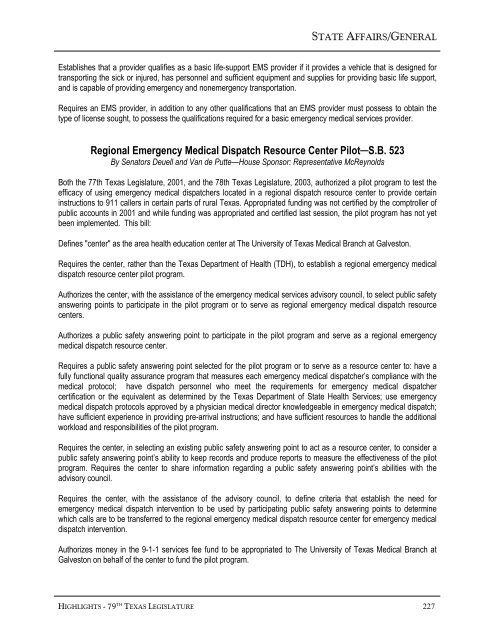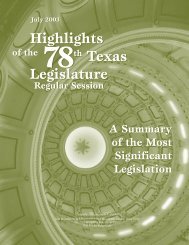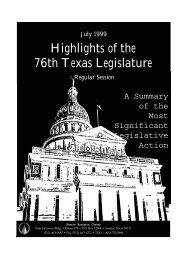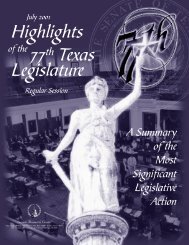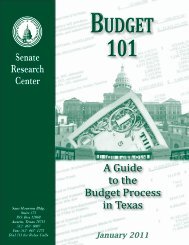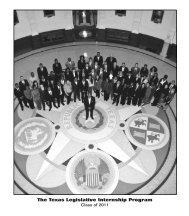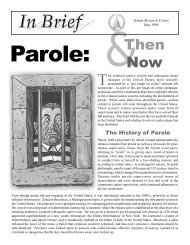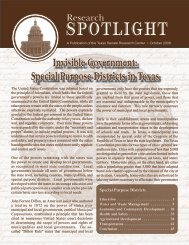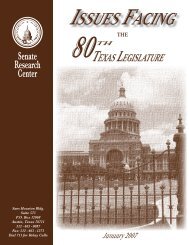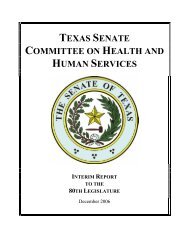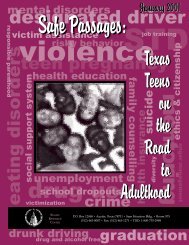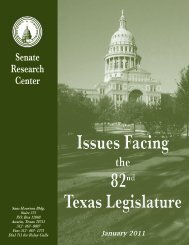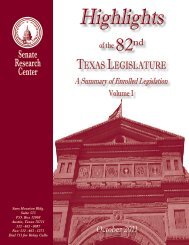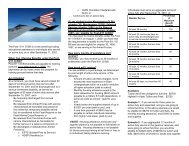Highlights of the 79th Texas Legislature - Senate
Highlights of the 79th Texas Legislature - Senate
Highlights of the 79th Texas Legislature - Senate
You also want an ePaper? Increase the reach of your titles
YUMPU automatically turns print PDFs into web optimized ePapers that Google loves.
STATE AFFAIRS/GENERAL<br />
Establishes that a provider qualifies as a basic life-support EMS provider if it provides a vehicle that is designed for<br />
transporting <strong>the</strong> sick or injured, has personnel and sufficient equipment and supplies for providing basic life support,<br />
and is capable <strong>of</strong> providing emergency and nonemergency transportation.<br />
Requires an EMS provider, in addition to any o<strong>the</strong>r qualifications that an EMS provider must possess to obtain <strong>the</strong><br />
type <strong>of</strong> license sought, to possess <strong>the</strong> qualifications required for a basic emergency medical services provider.<br />
Regional Emergency Medical Dispatch Resource Center Pilot─S.B. 523<br />
By Senators Deuell and Van de Putte—House Sponsor: Representative McReynolds<br />
Both <strong>the</strong> 77th <strong>Texas</strong> <strong>Legislature</strong>, 2001, and <strong>the</strong> 78th <strong>Texas</strong> <strong>Legislature</strong>, 2003, authorized a pilot program to test <strong>the</strong><br />
efficacy <strong>of</strong> using emergency medical dispatchers located in a regional dispatch resource center to provide certain<br />
instructions to 911 callers in certain parts <strong>of</strong> rural <strong>Texas</strong>. Appropriated funding was not certified by <strong>the</strong> comptroller <strong>of</strong><br />
public accounts in 2001 and while funding was appropriated and certified last session, <strong>the</strong> pilot program has not yet<br />
been implemented. This bill:<br />
Defines "center" as <strong>the</strong> area health education center at The University <strong>of</strong> <strong>Texas</strong> Medical Branch at Galveston.<br />
Requires <strong>the</strong> center, ra<strong>the</strong>r than <strong>the</strong> <strong>Texas</strong> Department <strong>of</strong> Health (TDH), to establish a regional emergency medical<br />
dispatch resource center pilot program.<br />
Authorizes <strong>the</strong> center, with <strong>the</strong> assistance <strong>of</strong> <strong>the</strong> emergency medical services advisory council, to select public safety<br />
answering points to participate in <strong>the</strong> pilot program or to serve as regional emergency medical dispatch resource<br />
centers.<br />
Authorizes a public safety answering point to participate in <strong>the</strong> pilot program and serve as a regional emergency<br />
medical dispatch resource center.<br />
Requires a public safety answering point selected for <strong>the</strong> pilot program or to serve as a resource center to: have a<br />
fully functional quality assurance program that measures each emergency medical dispatcher’s compliance with <strong>the</strong><br />
medical protocol; have dispatch personnel who meet <strong>the</strong> requirements for emergency medical dispatcher<br />
certification or <strong>the</strong> equivalent as determined by <strong>the</strong> <strong>Texas</strong> Department <strong>of</strong> State Health Services; use emergency<br />
medical dispatch protocols approved by a physician medical director knowledgeable in emergency medical dispatch;<br />
have sufficient experience in providing pre-arrival instructions; and have sufficient resources to handle <strong>the</strong> additional<br />
workload and responsibilities <strong>of</strong> <strong>the</strong> pilot program.<br />
Requires <strong>the</strong> center, in selecting an existing public safety answering point to act as a resource center, to consider a<br />
public safety answering point’s ability to keep records and produce reports to measure <strong>the</strong> effectiveness <strong>of</strong> <strong>the</strong> pilot<br />
program. Requires <strong>the</strong> center to share information regarding a public safety answering point’s abilities with <strong>the</strong><br />
advisory council.<br />
Requires <strong>the</strong> center, with <strong>the</strong> assistance <strong>of</strong> <strong>the</strong> advisory council, to define criteria that establish <strong>the</strong> need for<br />
emergency medical dispatch intervention to be used by participating public safety answering points to determine<br />
which calls are to be transferred to <strong>the</strong> regional emergency medical dispatch resource center for emergency medical<br />
dispatch intervention.<br />
Authorizes money in <strong>the</strong> 9-1-1 services fee fund to be appropriated to The University <strong>of</strong> <strong>Texas</strong> Medical Branch at<br />
Galveston on behalf <strong>of</strong> <strong>the</strong> center to fund <strong>the</strong> pilot program.<br />
HIGHLIGHTS - 79 TH TEXAS LEGISLATURE 227


